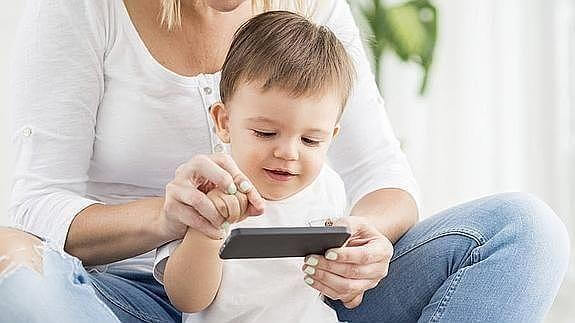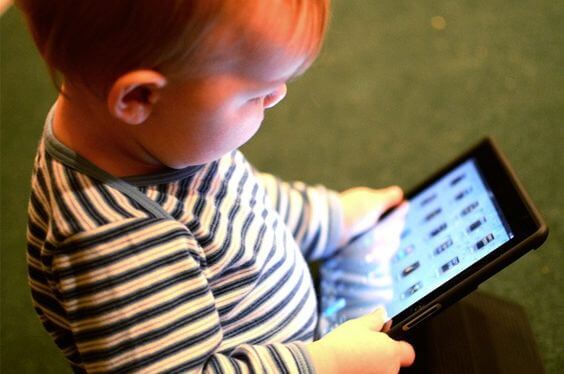Cell Phone Use Can Cause Speech Delay

In order to consciously discuss speech delay, certain things should be understood. Each child learns in their own way and at their own pace. But by certain stages there should be results.
These days many new medical conditions have emerged, such as those caused by the use of technological devices. If your baby has had frequent contact with a cell phone, they may suffer from from a delay in speech acquisition.
Recent studies have identified a relationship between speech delay and the use of devices like cell phones. It isn’t a matter of anything specific that triggers this, but cell phones may have a lot of the responsibility.
We often compare our own children with other people’s, especially in terms of their development, like whether mine is already crawling or if yours learns to walk first. However, these activities are acquired at a common life stage.
Between six months and two years of age, toddlers should already have said a few words. They will have babbled, said “Mama” or asked for water. Even so, if they have not done this, we still cannot say for certain that they are developmentally delayed.

Experts say that a child can only be considered to have a speech delay when the following is observed:
- Between 12 and 15 months, the child has not said or pronounced any clear words. In this case we mean simple words, like “Mama.”
- At 18 months they do not seem to understand our words, for example “no.” Instructions like “stop” or “sit down,” are usually understood at this age even if the child does not say them.
- At three years, the child is not able to produce short sentences.
- At 4 or 5 years old, they are not really able to tell short stories, or they simply do not attempt to.
How Does the Cell Phone Use Influence Speech Delay?
According to the results of a study carried out by the American Academy of Pediatrics, toddlers who use devices such as cell phones or electronic tablets are at risk. We know that these devices can distract children, and although we realize it may not be the best, we let them have them anyway.
Blue light emitted by these devices, as well as loud noises, are also hazardous. However, the above study is mainly concerned with the reasons speech development may be affected.
To that effect, researchers say that a half an hour a day of contact with a cell phone can cause problems with language acquisition. It seems that contact with the device in a way eliminates the need to communicate.
While they are distracted, they no longer listen to people speaking around them. And on top of that, they do not need to say anything to anyone.
Experts recommend no contact with cell phones until after the first year and a half of the child’s life, when they can avoid some of the risks. This advice is based on a study carried out on 800 children between the ages of six and 24 months.
The study took place from 2011 to 2015, and followed each child’s case. Language development was observed in the children starting at six months. The study ended when the children were two years old.
Expert Recommendations

Some factors come into play when we discuss the risks involved with using these types of devices. As we mentioned earlier, they will not have a delay in speech development just from handling a cell phone. It is more about the time spent using the device, as well as what they do on it.
To this effect, Dr. Catherine Birken, the researcher behind this study, recommends the following:
- The recommended age to start allowing them to use tablets and cell phones is after 18 months.
- The use of technological devices should be limited to less than two hours per day, and should not be consecutive.
- Put games and content on it that are adapted to their age, preferably ones that are educational and practical.
- Keep an eye on them even when they are clearly very absorbed in an activity.
- Make sure they don’t show any delays in psychological or psychomotor development.
- Never stop talking to them. In order for little ones to properly develop speech, they need to be listening to us all the time.
All cited sources were thoroughly reviewed by our team to ensure their quality, reliability, currency, and validity. The bibliography of this article was considered reliable and of academic or scientific accuracy.
- Besolí, G., Palomas, N., & Chamarro, A. (2018). Uso del móvil en padres, niños y adolescentes: Creencias acerca de sus riesgos y beneficios. Aloma: Revista de Psicologia, Ciències de l’Educació i de l’Esport, 36(1). http://revistaaloma.net/index.php/aloma/article/view/328
- Bringué, X. & Sábada, Ch. (2011). La Generación Interactiva en Madrid. Niños y adolescentes ante las pantallas. Foro Generaciones Interactivas – Fundación Telefónica. https://dadun.unav.edu/bitstream/10171/20593/1/GGII-Madrid-final.pdf
- McBride, D. L. (2011). Risks and benefits of social media for children and adolescents. Journal of Pediatric Nursing, 26, 498-499. https://www.ncbi.nlm.nih.gov/pubmed/21930038
This text is provided for informational purposes only and does not replace consultation with a professional. If in doubt, consult your specialist.
